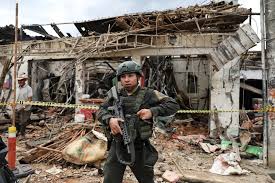Seven minors, including four girls and three boys, were killed this week during Colombian military airstrikes targeting an alleged drug-running guerrilla group in the country’s southern Amazon region, the national ombudsman’s office confirmed on Saturday.
Iris Marin, head of the office, initially reported six minors had died, noting that they were victims of forced recruitment by the armed group. The toll was later updated to seven, all teenagers.
Colombian military authorities said the operation, ordered by President Gustavo Petro, killed 19 members of an ex-FARC splinter group in early November. The military also reported rescuing three minors from rebel captivity during the strikes. Separate strikes in Arauca province near the Venezuelan border killed nine additional suspected guerrillas.
President Petro defended the operation on social media, acknowledging the tragedy while emphasizing the need to protect soldiers stationed nearby. “Of course, every death is regrettable, especially those of minors. But if I had let Ivan Mordisco’s 150 men advance, they would have ambushed 20 young soldiers,” he said. Petro likened the wanted rebel leader to the late cocaine baron Pablo Escobar and has launched a manhunt with million-dollar rewards.
Defense Minister Pedro Sanchez described the operation as necessary due to the “imminence and severity of the threat” against the soldiers. Authorities are also investigating whether high-ranking rebel commander Antonio Medina, involved in clashes between ex-FARC and National Liberation Army (ELN) fighters, was killed in the strikes.
Petro has faced mounting U.S. pressure over alleged inaction against cocaine-trafficking groups. In October, Washington imposed sanctions on the president, his family, and a top aide, accusing them of enabling cartels. Petro, a former guerrilla, has previously opted for negotiations rather than open warfare with armed groups, a strategy now under scrutiny amid pre-election tensions.
The deadly airstrikes highlight the ongoing challenges Colombia faces in balancing counter-narcotics operations with human rights concerns, particularly the protection of minors recruited by armed groups.

